
Healthcare is an industry that demands the highest levels of ethics, integrity, and adherence to regulations. With countless lives at stake every day, it becomes crucial to establish effective compliance programs in healthcare organizations. These programs safeguard against unethical practices, ensuring that patient care remains a top priority. We will delve into the world of compliance programs in healthcare and explore their numerous benefits.
What Are Compliance Programs in Healthcare?
Compliance programs in healthcare refer to a set of policies, procedures, and measures put in place by healthcare organizations to ensure strict adherence to:
- Laws
- Regulations
- Ethical Standards
These programs aim to prevent:
- Mishandling of Patient Information
- Injury and Illness
- Fraud Waste and Abuse
- Other Forms of Misconduct
By implementing comprehensive compliance programs in healthcare, providers can demonstrate their commitment to operating with transparency and integrity.
The Benefits of a Compliance Program in Healthcare
A compliance program in healthcare offers a range of benefits that not only ensure legal and ethical operations but also enhance patient care and financial stability.
1. Enhancing Patient Safety
One of the primary goals of compliance programs in healthcare is to prioritize patient safety. By adhering to regulations and best practices, these programs help:
- Reduce Medical Errors
- Improve Quality of Care
- Minimize Adverse Events
Through proper compliance training and monitoring processes, healthcare professionals become equipped with the knowledge and skills necessary for delivering safe and efficient care.
2. Preventing Fraud and Abuse
Fraudulent activities can have severe consequences on both patients’ well-being and the financial stability of healthcare organizations. A robust compliance program acts as a deterrent against fraudulent behavior by establishing:
- Internal Controls
- Conducting Audits
- Promoting Ethical Conduct Among Staff
This protects patients and helps maintain trust between healthcare providers and payers.
3. Mitigating Legal Risks
Non-compliance with applicable laws and regulations can lead to costly legal battles for healthcare organizations. Compliance programs play a vital role in identifying potential risks early on through risk assessments and ongoing monitoring. They provide a framework for addressing areas where legal requirements may be overlooked, ensuring that organizations remain within the boundaries of the law.
4. Fostering a Culture of Accountability
A strong compliance program promotes a culture of accountability throughout the healthcare organization. By establishing clear expectations and consequences for non-compliance, employees are encouraged to act ethically and report any concerns or violations they may witness. This creates an environment where integrity is valued, and misconduct is promptly addressed.
5. Improving Operational Efficiency
Compliance programs streamline processes and reduce administrative burdens by standardizing procedures and documentation requirements. By implementing automated systems and workflows, healthcare organizations can:
- Improve Efficiency
- Minimize Errors
- Allocate Resources More Effectively
This allows staff members to focus on providing quality care rather than navigating complex compliance issues.
6. Enhancing Reputation and Trust
In today’s interconnected world, reputation holds immense value. A healthcare organization with a robust compliance program demonstrates its commitment to:
- Ethical Practices
- Transparency
- Patient Well-Being
Such organizations are more likely to gain the trust of:
- Patients
- Regulatory Bodies
- Payers
- Other Stakeholders
Trust fosters long-term relationships and positions healthcare providers as leaders in their industry.
Compliancy Group: The Most Efficient Compliance Program in Healthcare
Compliancy Group stands out as the most efficient compliance program in healthcare due to its comprehensive and streamlined approach. With our proprietary software, The Guard, we provide a user-friendly platform that guides healthcare organizations through the entire compliance process.
Our unique methodology ensures that all necessary measures are taken to meet the complex regulatory requirements governing patient data protection. The program offers step-by-step guidance on risk assessment, policy creation, staff training, and ongoing monitoring to ensure continuous compliance.








